- Home
- Chinua Achebe
Hopes and Impediments: Selected Essays 1965-87 Page 8
Hopes and Impediments: Selected Essays 1965-87 Read online
Page 8
Running through Mr. Allen’s review is the overriding thesis that Ouologuem has somehow restored dignity to his people and their history by investing them with responsibility for violence and evil. Mr. Allen returns to this thesis again and again, merely changing the form of words. And we are to understand, by fairly clear implication, that this was something brave and new for Africa, this manly assumption of responsibility.
Of course a good deal of colonialist rhetoric always turned on that very question. The moral inferiority of colonized peoples, of which subjugation was a prime consequence and penalty, was most clearly demonstrated in their unwillingness to assume roles of responsibility. As long ago (or as recently, depending on one’s historical perspective) as 1910 the popular English novelist John Buchan wrote a colonialist classic, Prester John, in which we find the words: “That is the difference between white and black, the gift of responsibility.” And the idea did not originate with Buchan, either. It was a foundation tenet of colonialism and a recurrent element of its ideology and rhetoric. Now, to tell a man that he is incapable of assuming responsibility for himself and his actions is of course the utmost insult, to avoid which some Africans will go to any length, will throw anything into the deal; they will agree, for instance, to ignore the presence and role of racism in African history or pretend that somehow it was all the black man’s own fault. Which is complete and utter nonsense. For whatever faults the black man may have or whatever crimes he committed (and they were, and are, legion) he did not bring racism into the world. And no matter how emancipated a man may wish to appear or how anxious to please by his largeness of heart, he cannot make history simply go away. Not even a brilliant writer could hope to do that. And as for those who applaud him for trying, who acclaim his bold originality in “restoring historical initiative to his people” when in reality all he does is pander to their racist and colonialist attitudes, they are no more than unscrupulous interrogators taking advantage of an ingratiating defendant’s weakness and trust to egg him on to irretrievable self-incrimination.
That a “critic” playing on the ideological team of colonialism should feel sick and tired of Africa’s “pathetic obsession with racial and cultural confrontation” should surprise no one. Neither should his enthusiasm for those African works that show “no easy antithesis between white and black.” But an African who falls for such nonsense, not only in spite of Africa’s so very recent history but, even more, in the face of continuing atrocities committed against millions of Africans in their own land by racist minority regimes, deserves a lot of pity. Certainly anyone, white or black, who chooses to see violence as the abiding principle of African civilization is free to do so. But let him not pass himself off as a restorer of dignity to Africa, or attempt to make out that he is writing about man and about the state of civilization in general. (You could as well claim that fifty years ago Frank Melland’s In Witchbound Africa was an account of the universality of witchcraft and a vindication of Africa.) The futility of such service to Africa, leaving aside any question of duplicity in the motive, should be sufficiently underscored by one interesting admission in Mr. Allen’s review:
Thus, there is no reason for western reviewers of this book to exult in a black writer’s admission of the savagery, sensuality and amorality of his race: he isn’t talking about his race as Senghor or Cleaver do: he’s talking about us all.
Well, how obtuse of these “western reviewers” to miss that point and draw such wrong conclusions! But the trouble is that not everyone can be as bright as Mr. Allen. Perhaps for most ordinary people what Africa needs is a far less complicated act of restoration. The Canadian novelist and critic Margaret Laurence saw this happening already in the way many African writers are interpreting their world, making it
… neither idyllic, as the views of some nationalists would have had it, nor barbaric, as the missionaries and European administrators wished and needed to believe.6
And in the epilogue to the same book she makes the point even more strongly:
No writer of any quality has viewed the old Africa in an idealized way, but they have tried to regain what is rightly theirs—a past composed of real and vulnerable people, their ancestors, not the figments of missionary and colonialist imaginations.
Ultimately the question of ideological sides which Mr. Allen threw in only to dismiss it again with contempt may not be as far-fetched as he thinks. For colonialism itself was built also on an ideology (although its adherents may no longer realize it) which, despite many setbacks, survives into our own day, and indeed is ready again at the end of a quiescent phase of self-doubt for a new resurgence of proselytization, even, as in the past, among its prime victims!
Fortunately, it can no longer hope for the role of unchallenged arbiter in other people’s affairs that it once took so much for granted. There are clear signs that critics and readers from those areas of the world where continuing incidents and recent memories of racism, colonialism and other forms of victimization exist will more and more demand to know from their writers just on whose ideological side they are playing. And we writers had better be prepared to reckon with this questioning. For no amount of prestige or laurels of metropolitan reputation would seem large enough to silence or overawe it. Consider, for instance, a recent judgement on V. S. Naipaul by a fellow Caribbean, Ivan Van Sertima:
His brilliancy of wit I do not deny but, in my opinion, he has been overrated by English critics whose sensibilities he insidiously flatters by his stock-in-trade: self-contempt.7
A Nigerian, Ime Ikiddeh, was even less ceremonious in his dismissal of Naipaul, who he thought did not deserve the attention paid to him by Ngũgĩ wa Thiong’o in his Homecoming.8 One need not accept these judgements in order to see them as signs of things to come.
Meanwhile the seduction of our writers by the blandishments of colonialist criticism is matched by its misdirection of our critics. Thus, an intelligent man like Dr. Sunday Anozie, the Nigerian scholar and critic, is able to dismiss the high moral and social earnestness sometimes expressed by one of our greatest poets, Christopher Okigbo, as only a mark of underdevelopment. In his book Christopher Okigbo, the most extensive biographical and critical study of the poet to date, Dr. Anozie tells us of Okigbo’s “passion for truth,” which apparently makes him sometimes too outspoken, makes him the talkative weaverbird “incapable of whispered secrets.” And he proceeds to offer the following explanation:
No doubt the thrill of actualized prophecy can sometimes lead poets particularly in the young countries to confuse their role with that of seers, and novelists to see themselves as teachers. Whatever the social, psychological, political and economic basis for it in present-day Africa, this interchangeability of role between the creative writer and the prophet appears to be a specific phenomenon of underdevelopment and therefore, like it also, a passing or ephemeral phase.9
And he cites the authority of C. M. Bowra in support of his explanation. The fallacy of the argument lies, of course, in its assumption that when you talk about a people’s “level of development” you define their total condition and assign them an indisputable and unambiguous place on mankind’s evolutionary ladder; in other words, that you are enabled by the authority of that phrase to account for all their material as well as spiritual circumstance. Show me a people’s plumbing, you say, and I can tell you their art.
I should have thought that the very example of the Hebrew poet/prophets which Dr. Anozie takes from Bowra to demonstrate underdevelopment and confusion of roles would have been enough to alert him to the folly of his thesis. Or is he seriously suggesting that the poetry of these men—Isaiah, for example—written, it seems, out of a confusion of roles, in an underdeveloped society, is less good than what is written today by poets who are careful to remain within the proper bounds of poetry within developed societies? Personally, I should be quite content to wallow in Isaiah’s error and write “For unto us a child is born.”
Incidentally, any reader who is at all famili
ar with some of the arguments that go on around modern African literature will have noticed that in the passage I have just quoted from Dr. Anozie he is not only talking about Okigbo but also alluding (with some disapproval) to a paper I read at Leeds University ten years ago which I called “The Novelist as Teacher”; Anozie thus kills two weaverbirds dexterously with one stone! In his disapproval of what I had to say he follows, of course, in the footsteps of certain Western literary schoolmasters from whom I had already earned many sharp reprimands for that paper, who told me in clear terms that an artist had no business being so earnest.
It seems to me that this matter is of serious and fundamental importance, and must be looked at carefully. Earnestness and its opposite, levity, may be neither good nor bad in themselves but merely appropriate or inappropriate according to circumstance. I hold, however, and have held from the very moment I began to write, that earnestness is appropriate to my situation. Why? I suppose because I have a deep-seated need to alter things within that situation, to find for myself a little more room than has been allowed me in the world. I realize how pompous or even frightening this must sound to delicate sensibilities, but I can’t help it.
The missionary who left the comforts of Europe to wander through my primeval forest was extremely earnest. He had to be; he came to change my world. The builders of empire who turned me into a “British protected person” knew the importance of being earnest; they had that quality of mind which Imperial Rome before them understood so well: gravitas. Now, it seems to me pretty obvious that if I desire to change the role and identity fashioned for me by those earnest agents of colonialism I will need to borrow some of their resolve. Certainly, I could not hope to do it through self-indulgent levity.
But of course I do appreciate also that the world is large and that all men cannot be, indeed must not be, of one mind. I appreciate that there are people in the world who have no need or desire to change anything. Perhaps they have already accomplished the right amount of change to ensure their own comfort. Perhaps they see the need for change but feel powerless to attempt it, or perhaps they feel it is someone else’s business. For these people, earnestness is a dirty word or is simply tiresome. Even the evangelist, once so earnest and certain, now sits back in contemplation of his church, its foundation well and truly laid, its edifice rising majestically where once was jungle; the colonial governor who once brought his provinces so ruthlessly to heel prefers now to speak of the benefits of peace and orderly government. Certainly, they would much rather have easy-going natives under their jurisdiction than earnest ones—unless of course the earnestness be the perverse kind that turns in against itself.
The first nationalists and freedom fighters in the colonies, hardly concerned to oblige their imperial masters, were offensively earnest. They had no choice. They needed to alter the arrangement which kept them and their people out in the rain and the heat of the sun. They fought and won some victories. They changed a few things and seemed to secure certain powers of action over others. But quite quickly the great collusive swindle that was independence showed its true face to us. And we were dismayed; but only momentarily for even in our defeat we had gained something of inestimable value—a baptism of fire.
And so our world stands in just as much need of change today as it ever did in the past. Our writers responding to something in themselves and acting also within the traditional concept of an artist’s role in society—using his art to control his environment—have addressed themselves to some of these matters in their art. And their concern seems to upset certain people whom history has dealt with differently and who persist in denying the validity of experiences and destinies other than theirs. And worst of all, some of our own critics who ought to guide these people out of their error seem so anxious to oblige them. Whatever the social, psychological, political and economic basis for this acquiescence, one hopes that it is only a passing and an ephemeral phase!
If this earnestness we speak of were manifested by just one or two writers in Africa there might perhaps be a good case for dismissing it out of hand. But look at the evidence:
Amos Tutuola has often given as a reason for his writing the need to preserve his traditional culture. It is true that a foreign critic, Adrian Roscoe, has chosen to jubilate over what appears to him like Tutuola’s lack of “an awareness of cultural, national and racial affinities,”10 but such an opinion may reflect more accurately his own wishful thinking than Tutuola’s mind. Certainly a careful reading of The Palm-Wine Drinkard will not bear out the assertion that colonialism is “dead for him.” Why would he go out of his way to tell us, for example, that “both white and black deads were living in the Dead’s Town”11 unless he considers the information significant, as indeed anyone who lived in the Lagos of the 1950s would readily appreciate? For although Nigeria experienced only “benign colonialism,” it required a monumental demonstration of all nationalist organizations in the territory after a particularly blatant incident of racism in a Lagos hotel to compel the administration into token relaxation of the practice whereby Whites and Blacks lived in trim reservations or squalid townships separated by a regulation two-mile cordon sanitaire. Some day a serious critic interested in such matters will assemble and interpret Tutuola’s many scattered allusions to colonialism for the benefit of more casual readers. For there are such intriguing incidents as the Drinkard’s deliverance of the Red People from an ancient terror which required them to sacrifice one victim every year, for which blessing he lives among them for a while exploiting their cheap labour to develop and extend his plantations “becoming richer than the rest of the people in that town” until the moment of crisis arrives and he causes “the whole of them” to be wiped out. Such a critic will no doubt pay particular attention to the unperturbed and laconic comment of the deliverer’s wife: “… all the lives of the natives were lost and the life of the non-natives saved.”12 But until that serious critic comes along, Mr. Roscoe can certainly have the comfort of believing that “if Achebe and Soyinka want to write in order to change the world, Tutuola has other reasons.”
And then Camara Laye. As recently as 1972 he was saying in an interview:
In showing the beauty of this culture, my novel testifies to its greatness. People who had not been aware that Africa had its own culture were able to grasp the significance of our past and our civilization. I believe that this understanding is the most meaningful contribution of African literature.13
The distinguished and versatile Sierra Leonian, Davidson Abioseh Nicol—scientist, writer and diplomat—explaining why he wrote, said:
… because I found that most of those who wrote about us seldom gave any nobility to their African characters unless they were savages or servants or facing impending destruction. I knew differently.14
One could go on citing example after example of earnestness among African writers. But one final quotation—from Kofi Awoonor, the fine Ghanaian poet, novelist and essayist—should suffice:
An African writer must be a person who has some kind of conception of the society in which he is living and the way he wants the society to go.15
All this juvenile earnestness must give unbearable offence to mature people. Have we not heard, they may ask, what Americans say—that the place for sending messages is the Western Union? Perhaps we have; perhaps we haven’t. But the plain fact is that we are not Americans. Americans have their vision; we have ours. We do not claim that ours is superior; we only ask to keep it. For, as my forefathers said, the firewood which a people have is adequate for the kind of cooking they do. To levy a charge of underdevelopment against African writers today may prove as misguided and uninformed as a similar dismissal of African art by visitors of an earlier age before the coming of Picasso. Those worthy men saw little good around them, only child-like and grotesque distortions. Frank Willett, in his excellent book African Art, tells us of one such visitor to Benin in 1701, a certain David Nyendael, who on being taken to the royal gallery described the objects as be
ing:
… so wretchedly carved that it is hardly possible to distinguish whether they are most like men or beasts; notwithstanding which my guides were able to distinguish them into merchants, soldiers, wild beast hunters, etc.16
Most people today would be inclined to ascribe the wretchedness to Nyendael’s own mind and taste rather than to the royal art of Benin. And yet, for me, his comment is almost saved by his acknowledgement, albeit grudging, of the very different perception of his guides, the real owners of the culture.
The colonialist critic, unwilling to accept the validity of sensibilities other than his own, has made particular point of dismissing the African novel. He has written lengthy articles to prove its non-existence largely on the grounds that the novel is a peculiarly Western genre, a fact which would interest us if our ambition was to write “Western” novels. But, in any case, did not the black people in America, deprived of their own musical instruments, take the trumpet and the trombone and blow them as they had never been blown before, as indeed they were not designed to be blown? And the result, was it not jazz? Is any one going to say that this was a loss to the world or that those first Negro slaves who began to play around with the discarded instruments of their masters should have played waltzes and foxtrots? No! Let every people bring their gifts to the great festival of the world’s cultural harvest and mankind will be all the richer for the variety and distinctiveness of the offerings.
My people speak disapprovingly of an outsider whose wailing drowned the grief of the owners of the corpse. One last word to the owners. It is because our own critics have been somewhat hesitant in taking control of our literary criticism (sometimes—let’s face it—for the good reason that we will not do the hard work that should equip us) that the task has fallen to others, some of whom (again we must admit) have been excellent and sensitive. And yet most of what remains to be done can best be tackled by ourselves, the owners. If we fall back, can we complain that others are rushing forward? A man who does not lick his lips, can he blame the harmattan for drying them?

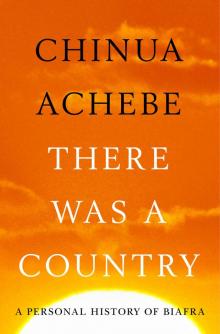 There Was a Country: A Memoir
There Was a Country: A Memoir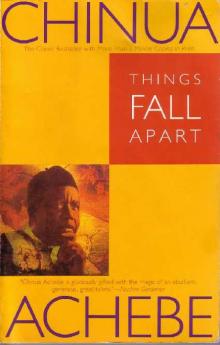 Things Fall Apart
Things Fall Apart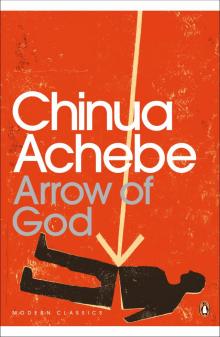 Arrow of God
Arrow of God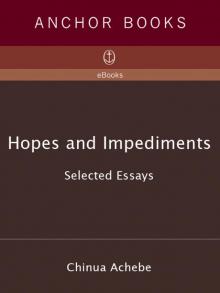 Hopes and Impediments: Selected Essays 1965-87
Hopes and Impediments: Selected Essays 1965-87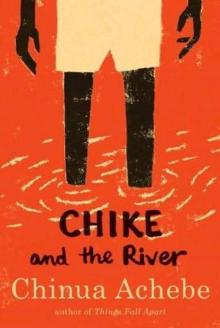 Chike and the River
Chike and the River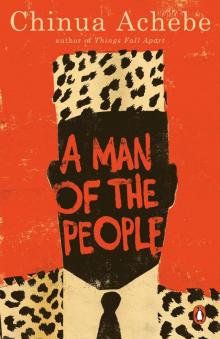 A Man of the People
A Man of the People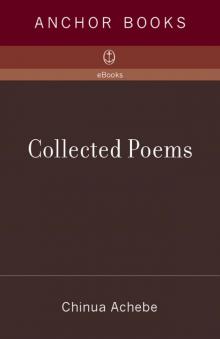 Chinua Achebe: Collected Poems
Chinua Achebe: Collected Poems The Education of a British-Protected Child: Essays
The Education of a British-Protected Child: Essays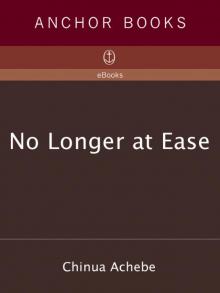 No Longer at Ease
No Longer at Ease Girls at War
Girls at War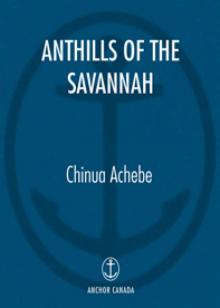 Anthills of the Savannah
Anthills of the Savannah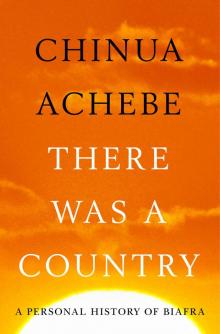 There Was a Country: A Personal History of Biafra
There Was a Country: A Personal History of Biafra The Education of a British-Protected Child
The Education of a British-Protected Child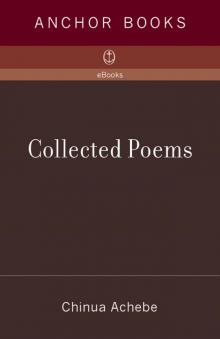 Collected Poems
Collected Poems